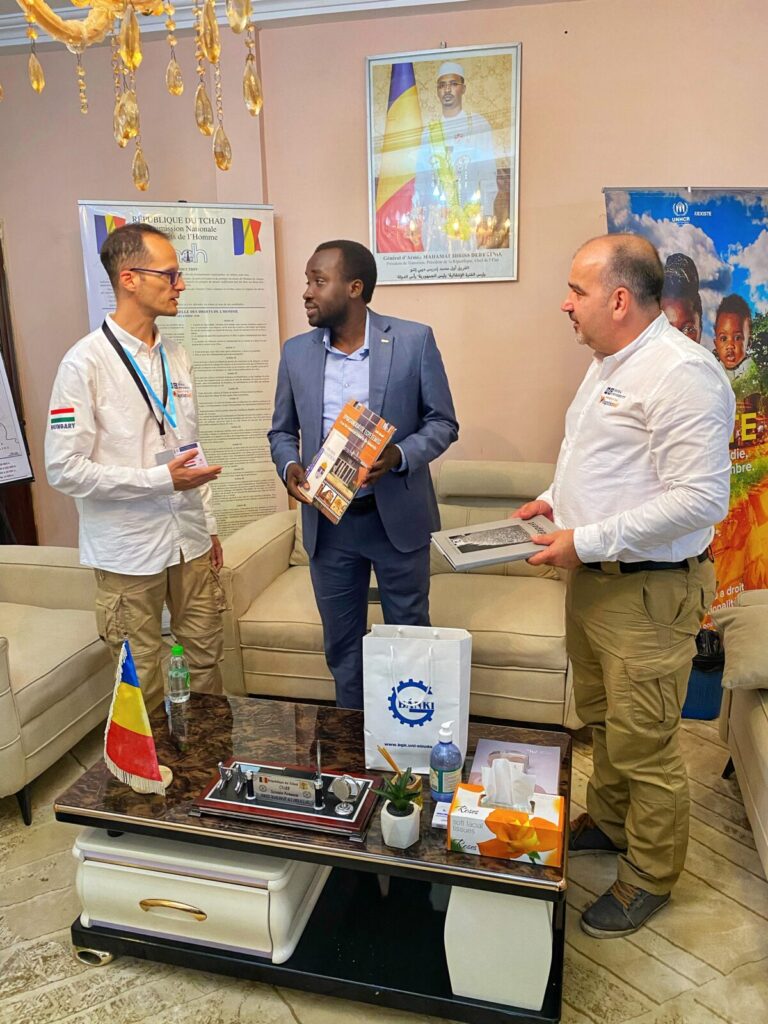Following a government request, the lecturers of the Bánki Donát Mechanical and Safety Engineering Faculty of Óbuda University’s Humanitarian Response Manager, a one-year post-graduate course in English which has been successfully launched for three years now, visited Chad to provide education as part of a broader humanitarian assistance project.
Dr. Dávid Vogel, one of the trainers of the course led by Prof. Dr. János Besenyő PhD., spoke about the project.

How did this humanitarian programme come about?
The Hungarian government made a decision to provide humanitarian support to Chad, supported through the Hungary Helps Agency, so it was essentially thanks to them that the programme could be realised.
How did you get involved in the Chad mission?
At the University of Óbuda, the Africa Research Institute is based at the Bánki Donát Faculty of Mechanical and Safety Engineering, which was founded in 2019 by Prof. Dr. János Besenyő. Currently, there are more than 60 scholars from all over the world who are committed to publish, attend conferences and conduct research under the auspices of this research institute. Actually, I am a senior research fellow of the institute. Several researchers are also actively involved in the Humanitarian Response Manager (HRM) postgraduate course, thus based on the government’s request we were also selected to be part of the project.
Is this the same training that you have done in Chad?
It was part of our Humanitarian Response Manager training course. However, we have also included, for example, an agricultural panel. We have tried to make educational activities more practice-oriented and we would like to continue to provide more personalised training, building on the foundations of our HRM course. Actually, it is more of a mentoring from a certain point of view.
In what field can students who complete the course find a job?
It is important to underline that the “students” in Chad are local camp leaders, from whom we ourselves have learned a lot, as they are also humanitarian professionals. The course covers the whole spectrum of humanitarian operations: international law, security issues, camp construction and organisation, civil-military relations, negotiation techniques and so on. The curriculum is extremely complex and, in addition to theoretical knowledge, there is a strong emphasis on practical training. Graduates can find jobs in humanitarian fields with this degree.
How many people could take part in the course?
Twenty-seven people applied. This number shows that there is a need for such a training, also in this part of the world far from Europe.
What was the biggest challenge for you?
There were 140 contact meetings with lectures and practical activities. We had to cram them into 2 weeks, starting early in the morning and running late into the evening. It was tough enough, but for the “students” absorbing such a great and almost completely new material was no small task either. Another challenge was the language difference. I mean that although we held the classes in English – as the accreditation was for English language training – most people in Chad speak French, so the classes were conducted with the help of English-French interpreters. This slowed down progress in certain cases.
In such difficult circumstances, how is the training structured?
We have devised a system of 3 modules: the first is the contact hours, the second is the writing of a thesis, and the third is the final exam and thesis defense. By absolving all modules, “students” can recieve tha same diploma as those who complete the course in Hungary.
What was the return on your assistance?
Perhaps the most important is that by gaining the knowledge and the diploma, the students who have completed the course – with this qualification – have the chance and opportunity to get jobs and build a career. I honestly hope they will succeed. And for us, it was an important confirmation that we were able to deal with such tasks in difficult circumstances. It is a positive feedback for both the trainers and the university that we are able to make such a course a success on the other side of the world.
What are your personal feelings about the mission as a whole?
We have experienced a lot during the first phase and we will try to correct any mistakes so that we can make the next cycle even more flexible and efficient. Personally, I am looking forward to get involved in the organisation of the next course that will scheduled for November, and I can see that my colleagues are enthusiastic to take part too. It’s a good team, for a good cause, and it’s recharging.
The original post in Hungarian is available on the University’s website by clicking on the link below: